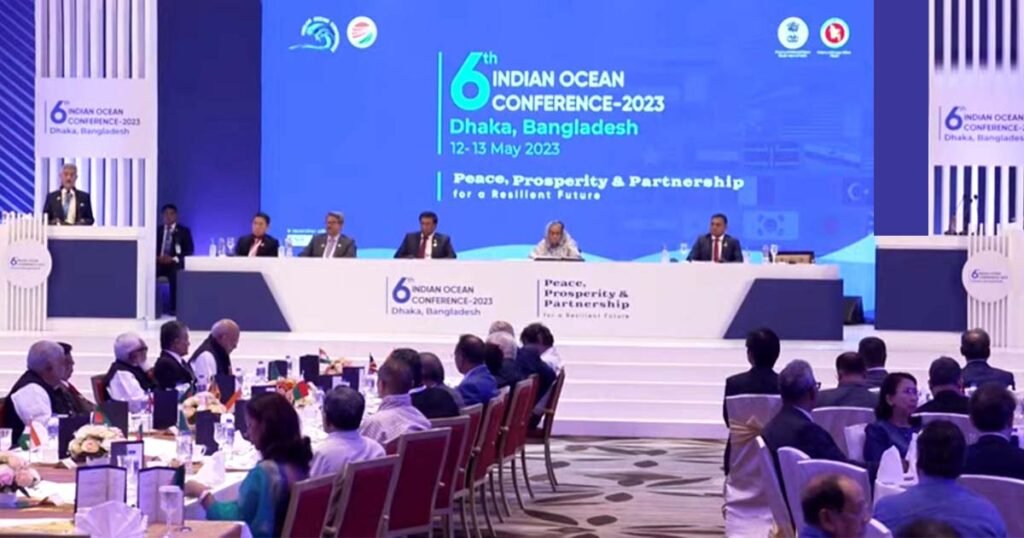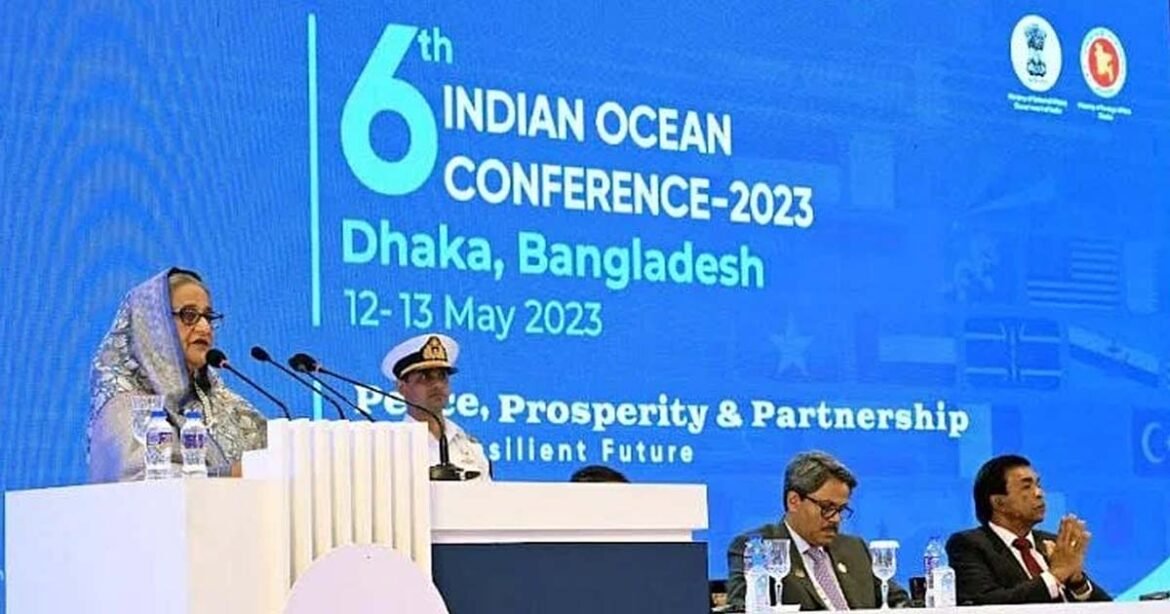Bangladesh Prime Minister Sheikh Hasina has outlined six priority areas to cultivate diplomacy and partnership among the nations of the Indian Ocean in order to promote prosperity.
The sixth edition of the Indian Ocean Conference (IOC) was held from 12th May to 13th May organized by India Foundation in association with the Ministry of Foreign Affairs, Government of Bangladesh where high-level government delegations and think tanks from at least 25 countries. had participated.
On Saturday, Prime Minister Sheikh Hasina spoke at an event commemorating the launch of the 6th Indian Ocean Conference-2023 at a city hotel. For the region’s “resilient future,” the PM has called to boost mutual trust and respect, building partnerships, and promoting marine diplomacy.
YOU CAN ALSO READ: KNOWING THE INDO-PACIFIC REGION: A NEW THEATER OF INTERNATIONAL RELATIONS
“The Indian Ocean holds significant importance for not only Bangladesh, but for all the countries in the region due to its geographical position. I would like to underscore six priority areas at this 6th Indian Ocean Conference. We have recently formulated its Indo-Pacific Outlook,” PM Hasina said.
What are the six priorities?
Priorities involve fostering maritime diplomacy, enhancing cooperation for climate resilience, boosting mutual trust, further enhancing maritime safety, promoting culture of peace, and supporting multilateral systems.
In presenting the proposals, the Prime Minister emphasized the importance of strengthening mutual trust and respect among member nations to enable strong partnerships to ensure stability and a robust future in the Indian Ocean.
She stated that the countries in the region of the Indian Ocean should foster “Maritime Diplomacy” for their development, thereby assuring a prosperous future, while the climate vulnerability of many countries in the region necessitates a strengthening of cooperation to reduce the impact of natural disasters.
The prime minister further highlighted the need to strengthen the existing mechanisms for maritime safety and security in the Indian Ocean, including emergency response at sea, search and rescue operations, and the upholding of international law-compliant freedom of navigation and overflight.
To create societies that are equitable, peaceful, and welcoming in the region, she advocated for the promotion of a ‘culture of peace’ and a development centered on the needs of the people, while women, who make up half of the world’s population, should be given due consideration.
She stated that it is necessary to promote open, transparent, rules-based multilateral systems that facilitate equitable and sustainable economic growth in the region and beyond.
Bangladesh promises to support in maintaining peace
The Premier stated that Bangladesh provided temporary shelter to more than 1.1 million Myanmar nationals who were forcibly displaced.
“This gesture avoided a major humanitarian catastrophe in the region. Now, we seek active support of the global community to repatriate the Rohingya people to their homeland in a safe and sustainable manner,” she added.
As a littoral state, Bangladesh has been a hub of maritime activities for centuries and is active in many regional platforms, PM Sheikh Hasina said, adding that Bangladesh is the current Chair of the Indian Ocean Rim Association and President of the Council of the International Seabed Authority. She stated that Bangladesh believes the Indian Ocean region faces both traditional and non-traditional challenges.
“We remain committed to playing our role for peace in the region, and expect all other countries to do the same to ensure a resilient future,” she said.
PM highlights the trade significance of Indian Ocean region
The Indian Ocean region has significant economic, political, and strategic implications for the Asia-Pacific and African regions, said Prime Minister. It accounts for 64 percent of the global population and 60 percent of the global GDP, she added. PM Hasina stated that the region’s oceans and seas contribute over 90 percent of global trade and 60 percent of oil transportation, and the real value of global maritime trade has tripled in the past 15 years.

“Oceans offer excellent opportunities in supporting sustainable development in countries the world over. Yet much of the potential still remains untapped,” she added.
The premier stated that despite the region’s potential, it confronts many challenges. She added that the countries in the Indian Ocean region must foster partnerships and cooperation to ensure peace and prosperity for all.
The “Territorial Waters and Maritime Zones Act, 1974″
PM Hasina stated that Bangabandhu Sheikh Mujibur Rahman emphasized the importance of maximizing the nation’s maritime resources for its development, growth, and stability.
To determine the limit of Bangladesh’s ‘Maritime Zones,’ she explained, Bangabandhu had adopted the “Territorial Waters and Maritime Zones Act, 1974.” This law enabled the conduct of various activities inside the zone’s limits and facilitated the exploration of the country’s maritime resources.
Notably, she stated, this Act went into effect eight years prior to the “United Nations Convention on the Law of the Sea, 1982” at a time when the global community had limited understanding of the subject.
How IOC’s theme and Bangabandhu’s UN speech aligns with current global situations?
The conference’s subject, “Peace, Partnership and Prosperity: Towards a resilient future,” according to premier Sheikh Hasina, is both pertinent and current. The recent COVID-19 pandemic, Russia-Ukraine war, and sanctions and counter-sanctions made the issue more pressing, she said.
“These have posed unprecedented challenges for all nations world over. Global recession, food, energy, and fertilizer crises have resulted in unbearable living conditions for all people of the world. The Indian Ocean region has also been facing challenges such as climate change, maritime security, terrorism, and natural disasters,” she said. She advised regional nations to work together to achieve peace and development for a brighter future.
In December 2022, the UNGA unanimously approved the “International Year of Dialogue as a Guarantee of Peace, 2023” resolution in the context of the post-Covid world and the Russia-Ukraine war. She noted that the resolution’s 14th paragraph included the Father of the Nation’s 1974 UN speech quote, which reflects Bangladesh’s foreign policy.
It reads, “Recognizing the importance of combating poverty, hunger, disease, illiteracy, and unemployment, and emphasizing that friendship to all and malice towards none, in the spirit of constructive cooperation, dialogue, and mutual understanding, will help to achieve these objectives.”
She said it’s relevant for Bangladesh in the Indian Ocean region as the government works to build resilience.
The “culture of peace” to advocate peacekeeping
Following Bangabandhu’s philosophy, PM Sheikh Hasina stated that Bangladesh became a passionate advocate for global peace. “In 1997 at the United Nations General Assembly, we tabled a resolution on “Culture of Peace” which was unanimously adopted,” she said. The UN named 2000 the “International Year of Culture of Peace” and 2001–2010 the “Culture of Peace and the Decade of Non-violence.”
“Bangladesh views the “Culture of Peace” as an essential element that will reinforce all aspects of peace. It is why Bangladesh is committed to UN’s global peacekeeping and peace-building endeavors. Currently our troop contribution to United Nations Peacekeeping is among the highest in the world,” she said.
Underlining Bangladesh’s growth and achievements among the world leaders
Bangladesh’s socio-economic progress and social fairness improved during the past decade, PM Hasina remarked. “Bangladesh is now the 35th largest economy in the world. Extreme poverty rate has gone down to 5.6 percent in recent years, and our per capita income has tripled to 2824 USD within a decade. Bangladesh has met all of the necessary criteria for graduating from the Least Developed Country (LDC) category to a developing country in 2026,” she said.
Sheikh Hasina said they aim to build “Smart Bangladesh” with strong infrastructure to help the economy. “Last year, we inaugurated the self-funded ‘Padma Multi-purpose Bridge,” she added.

Recently, the Prime Minister announced the capital’s first Metro Rail service. “We shall soon complete the Bangabandhu Sheikh Mujibur Rahman Tunnel, a 3.2-kilometer under-river tunnel in Chattogram, the first of its kind in South Asia,” she added.
“Our aspiration is to transform Bangladesh into a knowledge-based, modern, developed country, the ‘Sonar Bangla’ by 2041, and to build a prosperous and climate-resilient delta by 2100. Our strategy for achieving these goals involves promoting sustainable economic growth and generating opportunities for all,” she said.
In the opening session, Mauritius president Prithvirajsing Roopun, Vice-President of Maldives Faisal Nassem, External Affairs Minister of India Dr S Jaishankar, Minister in the Prime Minister’s Office and Second Minister of Foreign Affairs of Singapore Dr Maliki Osman spoke.
Bangladesh Foreign Minister Dr. AK Abdul Momen talked virtually while State Minister for Foreign Affairs M Shahriar Alam was on stage.
In addition, approximately 150 international attendees, including representatives from D8, SAARC, and BIMSTEC, attended the event. The conference excluded Myanmar.


